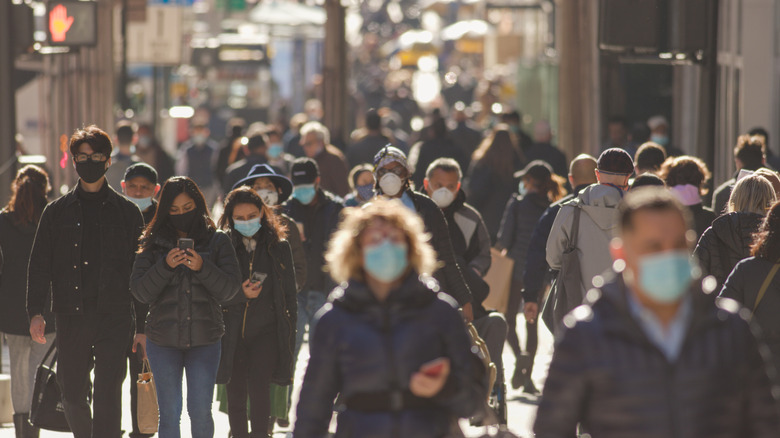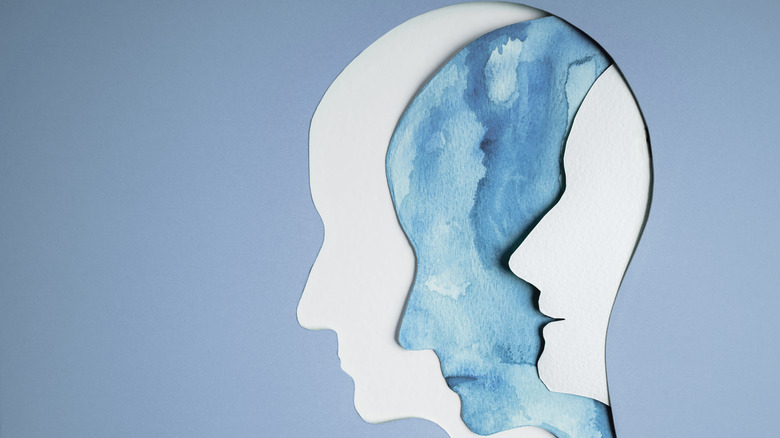Huge Study Details How The Pandemic Fundamentally Changed People's Personalities
Over the course of the COVID-19 pandemic, personality-typing giant Truity collected anonymous data for a two-year-long study that would make bold assertions about the pandemic's impacts on users' psychology and personalities.
Truity's CEO Molly Owens, a personality researcher who has previously spoken to The List about the Enneagram personality typing system, reflected on the study's findings and what they might mean for our post-pandemic personalities. "Thanks to what we believe to be the largest dataset of Big Five scores ever collected," Owens shared, "we were able to identify some fascinating shifts in personality measures over the course of the pandemic."
Owens understands the mass trauma of a global pandemic as influential on a deeper level, moreso than everyday interactions or social influences. "Although we typically understand personality as something that is relatively fixed for any given person, research also indicates that environmental forces can shift our behaviors and beliefs."
The study ultimately gave experts answers to what traits the sampled population — which included 2.8 million users — exhibited in increased or decreased increments in direct proportion to the pandemic's worsening or improving death toll and hospitalization numbers, available via the COVID-19 Tracking Project.
Oddly enough, the classic answers to "How has the pandemic changed you?" aren't necessarily backed up by the study's findings. Truity's CMO Abby Lunardini summed up that, "Contrary to popular anecdotal feedback about people becoming more Introverted during the pandemic, the relationship between extraversion and pandemic trends were in general found to be statistically insignificant." So, what did this study find?
Some personality changes can be linked to burnout
The study's measured personality traits included conscientiousness, neuroticism, agreeableness, and openness, which its collaborators provided definitions for in order to nail down just what had changed in participants' personalities and approaches to their lives. The full study can be found on PsyArXiv, and its author Cameron Berg has given The List their perspective on its findings.
"The COVID-19 pandemic has exhibited significant psychological and behavioral impacts, but a precise account of the way that the pandemic has altered human personality is still uncertain," the researcher began. "We saw striking correlations between pandemic data and personality traits — including the fact that individuals have steadily grown less conscientious and more neurotic over time since the beginning of the pandemic."
The study's definition for conscientiousness is as follows: "Conscientiousness is associated with achievement-striving and industrious behavior," via Abby Lunardini, Truity CMO. The study's results concluded that a mass decrease in this trait supports the case that burnout is, indeed, a looming risk in times of increased stress and over-work.
Researchers also found an increase in neuroticism that had a positive correlation to worsening pandemic factors, such as rising hospitalizations and death tolls. The study defined neuroticism as "a person's sensitivity to negative emotions, including fear, sadness and anxiety," per Truity. The source continued, "Neuroticism scores increased most strongly in response to longer-term, cumulative worsening of the pandemic (e.g. cumulative COVID deaths). The finding provides empirical support for widespread reports of the emotional exhaustion and long-term stress that many associate with the pandemic, particularly with respect to health-related risk-taking."
Creativity took a hit during the worst of the pandemic
The study also measured levels of agreeableness in participants, which were sourced anonymously from Truity. The definition used by the platform was as follows: "Agreeableness roughly describes the extent to which a person prioritizes the needs of others over their own," via Abby Lunardini, Truity CMO.
This trait was seen to increase most during shorter-term worsened pandemic conditions. That included hospitalization spikes, which the study characterized as a transient factor, or one that could change quickly. An increase might have manifested in more community-based efforts, such as supporting healthcare workers or sourcing equipment or funding, which Truity deems the "we're-all-in-this-together mentality" that requires agreeableness to function.
Openness is the last reported measure of personality change in the study. "Openness roughly describes a person's motivation to think abstractly and pursue beauty in things like art, music and culture," our source from Truity shared. "During these same challenging periods, people appear to have been significantly less motivated to be creative, exploratory and beauty-seeking."
Though we've heard stories of incredible artistic accomplishments during the pandemic — Taylor Swift releasing her surprise album, "Folklore," in August 2020, for example — for the most part, the study reflected a resistance to openness, or the "cerebral" quality necessary for artistic exploration and experimentation. But in moments when the pandemic improved, there was a measurable increase in openness, supporting the theory that a fight-or-flight pandemic response wasn't conducive to creativity or artistic thinking.
Our post-pandemic challenges aren't all in our heads
Ultimately, our source from Truity shared that data from this study, in conjunction with COVID-19 data, has far-reaching applications in measuring the psychological changes we have experienced during the pandemic. "Machine learning regression models indicate that metrics of the COVID-19 pandemic can be used to explain roughly half of the personality changes exhibited over the course of the pandemic," Truity's Abby Lunardini shared.
Of course, there will always be lingering questions surrounding how a globally shared trauma and unimaginable death toll will impact our psyches in the long-term, as well as our relationships with family and friends. However, the research happening now will begin giving us the answers to just how much the past two years have changed us collectively. Cameron Berg, the study's lead researcher concluded, "These findings are among the first to suggest that, at the population level, specific periods of the COVID-19 pandemic exhibited measurable and durable impacts on human personality."
Truity's CEO Molly Owens also summarized the data's findings that acute changes in the pandemic have had a measurable impact on personality factors including conscientiousness, neuroticism, agreeableness, and openness. "What we have seen with this research is that the pandemic has actually done this at the population level — making people less resilient to stress and less likely to engage in organized, goal-directed behaviors."
So, when we reflect on the past two years and the ways we have and haven't recovered our old selves, there will be an increasing amount of data to support us.



